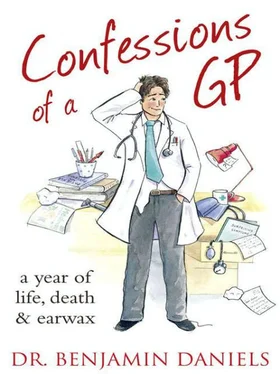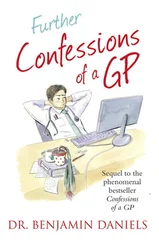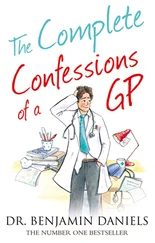There are some who respond well to her brutal but often reassuring honesty. ‘Mr Evans, you are not dying of pneumonia, you have a cold, now stop making such a fuss and go home.’ ‘Thank you, Doctor. I was hoping you would say it was nothing serious.’ If she decides that her patient is unwell, however, she will fight hand and tooth to get her/him the best treatment possible. I once heard some poor secretary trying to convince Dr Arbury that there would be a six-week wait until her patient could be seen by the hospital specialist. It didn’t take long before Dr Arbury had the consultant on the phone and was instructing him on exactly when and where the appointment would take place. Getting to the point quickly means that she always runs to time, which is also popular.
The interesting thing for me is how many of the more difficult, needy patients respond well to her. One of my patients is an addict whose alcohol and Valium use I had been trying desperately to reduce for some time. To my amazement, she responded much better to being given a good telling off by Dr Arbury than by my softly-softly sensitive encouragement. The advantage of being a patient in a big practice is that you can choose the GP who suits you. As new GPs, we are often warned not to be too nice and fluffy or we’ll get all the clingy needy patients latching on to us. Some difficult, needy patients often avoid seeing tough doctors like Dr Arbury because they don’t get the sympathy and attention they crave. It sounds a bit patronising but sometimes I think that a firm word and some home truths can do us all a lot of good. Sometimes, my patients need a sympathetic ear and a bit of genuine empathy. At other times, like all of us, they need a good kick up the backside. The difficult part is getting the right balance.
Patients often take it upon themselves to bring in various samples of their body fluids for my perusal. I would like to emphasise that this is normally not appreciated. A pot of urine is generally not too bothersome. Often in a jam jar, I hold it to the light, stroke my chin and let out a ‘hmmm’. I like doing this as it makes me feel like an old-fashioned doctor from the nineteenth century. Apparently, they were keen on diagnosing all sorts of illnesses by looking at the urine and then tasting it! Unlike a nineteenth-century doctor, I look but don’t drink. I also hold back from prescribing leaches or a tonic of mercury, but instead dipstick the urine and usually offer some antibiotics for a urine infection. If you are going to use a jam jar to hold your urine sample, please wash it out first. I once tested a urine sample and broke the news to the patient that it was full of sugar and therefore a diagnosis of diabetes was possible. Fortunately for the patient, it turned out that the urine was full of sugar because the jar still had a bit of strawberry jam swimming around in it.
Other body fluids that have been brought to my surgery include:
1. A condom full of semen – the patient was worried that it was a funny colour.
2. Various samples of vaginal discharge on tampons and one miscarriage wrapped up in a tissue.
3. Lots of poo. One woman brought in a week’s worth of her baby’s soiled nappies. Each was neatly labelled with a time and date and she lay them out on my surgery floor in chronological order. ‘As you can see, Dr Daniels, last Thursday morning is considerably more yellow and viscous in consistency than Saturday afternoon’s.’ I spend a lot of time convincing first-time mums it is normal for baby poo to be a bright mustard-yellow colour.
My only true body fluid aversion is sputum. I just can’t bear the stuff. Every time I view sputum, I get a flashback to a particularly long ward round in which I was involved as a medical student. I was extremely hung over and after several hours of traipsing around hot and smelly wards, we finally got to our last patient, who I will call Mr Phlegming. He was an old guy with emphysema (knackered lungs from smoking) and spent his days coughing up gallons of sputum and collecting it to show us on the ward round. As we arrived, Mr Phlegming enthusiastically held out a plastic cup full to the brim with sputum. It had a plastic lid on it and clearly none of us including the consultant was particularly keen to examine its contents. Medics are a hierarchical lot and the pot got handed down from consultant to registrar, to senior house officer to house officer and then finally to me. As the medical student, I was clearly at the bottom of the food chain and as I held the cup in my hand it felt unfeasibly heavy. ‘Come along, take a look,’ my consultant barked impatiently. Opening the lid, I was greeted with a swirling mass of muck. Not quite green and not quite brown. Not quite liquid and not quite solid. It had a colour and physical state all of its own. I began to feel my stomach gurgle and then made my excuses, just reaching the toilet before spewing. Give me shit, piss, blood and vomit any day.
I’m meeting George for the first time. Everyone tells me how great he is. ‘Good old George. He really is the salt of the earth. A retired docker. Always has a smile on his face. Brings us a tin of chocolates every Christmas. Everyone loves George.’ After ten minutes with George I can’t help but agree that he’s a nice old boy. He’s in his late seventies and, apart from a bad hip, he is basically fit and well. Cheery and friendly, we have a bit of a chat about the misfortunes of the local football team and he reminisces briefly about the good old days. After a bit of a look at his hip, I suggest that he might want to consider seeing the orthopaedic doctor as he could benefit from a hip replacement. ‘Well, if you think it might help, Doc… One thing, though, I won’t see no Paki doctor, will I?’
I hate it when this happens. You meet someone you think is nice enough and they turn out to be a raging bigot. It’s so much easier to hate racists when they fulfil my expectation of being all-round arseholes. What do I do now? Do I confront a man in his late seventies about his life-long racist beliefs and try to re-educate him? Perhaps I could accidentally forget to make the referral? Some might argue that as patients are now encouraged to have ‘choice’ over which consultant they see, I should follow his request and find him the white British surgeon he wants. Remember it’s not my job to judge, simply to treat and serve my patients to the best of my abilities.
‘Some of my best friends are Asian doctors and they are also very good at their jobs,’ I say firmly. ‘If you want the referral to be made, then you’ll get which ever doctor is allocated to you. We don’t make allowances for racism.’ George looks a bit taken aback.
‘I’m not a racist or nothing. It’s just I saw that Dr Singh bloke with my bad knee and I didn’t understand a word he was saying.’
My friend Chirag is a GP and was born in Wembley to Indian parents. He has a London accent, is good-looking, dresses slickly and is a bit of a charmer. He is well liked by even some of his most hardened racist patients. My friend Anil, however, was born and brought up in India. He moved to the UK seven years ago after qualifying from medical school back home in Bangalore. Anil has a moustache, a side parting, unfashionable clothes and a thick Indian accent. He struggles to understand anyone with a strong regional accent and couldn’t give a monkey’s about beer, football or regional rivalry. He is a very good and dedicated doctor but the patients tend not to warm to him and he has suffered from quite a lot of active discrimination from both patients and staff.
The Georges of this world appear to have made some changes with regard to their racism. In my experience they are now more tolerant of the colour of someone’s skin as long as the person speaks with a good British accent and can join in with a joke about Geordies or Scousers or the England football team. The other development is that patients tend to recognise that it is no longer acceptable to publicly verbalise their bigoted ideas, although they will still make a few sly racist comments if they think they can get away with them. I’ll leave it to you to decide if these changes are any form of improvement or not.
Читать дальше
Конец ознакомительного отрывка
Купить книгу











![Benjamin Franklin - Memoirs of Benjamin Franklin; Written by Himself. [Vol. 2 of 2]](/books/747975/benjamin-franklin-memoirs-of-benjamin-franklin-wr-thumb.webp)
![Benjamin Franklin - Memoirs of Benjamin Franklin; Written by Himself. [Vol. 1 of 2]](/books/748053/benjamin-franklin-memoirs-of-benjamin-franklin-wr-thumb.webp)